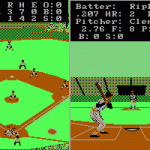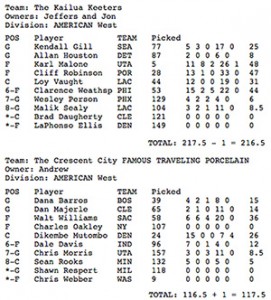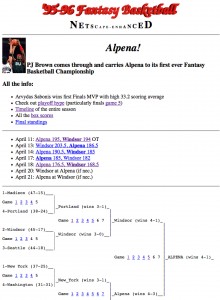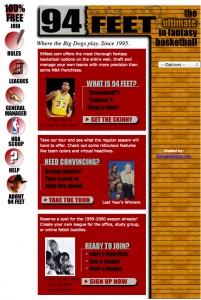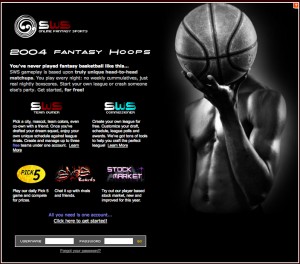The Most Elaborate Weekend Project of My Life: Why I Built, Maintained, and Sold Sports.ws
1 Jan 2013
I have vivid memories of getting excited about the Sunday edition of the Chicago Tribune as a kid. It listed every baseball stat for every player on every team. I think I spilled more Honey Nut Cheerios on sports pages than I actually ate. I liked playing baseball like any red-blooded American boy, but I think I liked it the same way Nate Silver does today, because it has more data points that just about anything in history.
I knew about Rotisserie baseball and how you could simulate your own games with friends, but damn if I was going to wait more than a week to get back results in the mail. I tried Strat-o-matic and Earl Weaver for Apple ][, but there was something about playing with a big group of friends that was most appealing about the potential of "fantasy" baseball.
I made up rules and manually scored a league for my friends early in high school. I can't say it made me the coolest kid in school, but it was fun. Don't worry, I still got chicks because I played trombone and was in advanced math.
League Zero
In college I met two things that changed me. The first was a dude on the track team named Jeffers who was named after a poet, was way more worldly than me, wore dog collars, and dyed my hair obscene colors on the regular. The second was the Internet.
In our college cross country coach's basement, we decided we needed something competitive (other than the running) to keep us busy for the winter. Jeffers wanted to start a fantasy basketball league from scratch. In 1994, the Internet wasn't much. But, we had "high" speed dorm connections and I'd had some luck building a joke (at first) Vlade Divac Fan Club that was featured on Yahoo!'s first What's Cool list and later on actual NBC TV.
Fantasy sports were coming into existence online, but only baseball and football were available, and they certainly weren’t mainstream. So we had to invent our own rules for basketball. We counted +1 points for the big categories (points, rebounds, assists, steals, blocks), let each team start one player at each position, have a sixth man, then two more count half-points. Two more on the roster could ride the pine. We added a one-point advantage/disadvantage for home-court. One catch: if a player didn’t play at all, the next in line would sub-in automatically (maybe the most important rule we added). If you play today, you’ll notice it’s a very crude version of the default game Sports.ws offers.
Rethinking Fantasy Sports
If you’re not versed in fantasy sports, you may wonder what the big deal is. Why so popular? Here’s my view: it’s the ultimate way to keep score. Take NFL Football and think about how many millions of hours are wasted spent watching games every Sunday. When friends watch together, the banter between plays usually revolves around what will happen next and postulating what the coaches, players, cheerleaders, trainers, and groundskeepers are thinking. There’s no score, it’s just argumentative fun. Fantasy sports is a way to keep track of this: winning is a proxy for a way to say “I’m a bigger fan than you.”
I think fantasy sports fans are underserved by mainstream rules. They’re just crappy and way too arbitrary. Let’s break down my six biggest gripes, and the guide I’ve used to create Sports.ws:
- Mainstream sites call game play “head to head” because they add up scores for a certain time period and score you against some else in your league. In fantasy football, you’re usually subbing out whoever’s not playing that week; for basketball you’re just picking players that play 4 games instead of 2. Actual good play isn’t rewarded enough.
- The default categories mainstream rules reward were seemingly selected because they’re available. In basketball, every major site counts shooting percentage for big points. You know who had a high field goal shooting percentage? Shaquille O’Neal: great player, one of the worst shooters in history. Add some value to stats if you use them. Kudos to any site that lets you customize point values, but offer meaningful stat values as a default.
- For leagues that draft, 99% of mainstream sites steer you towards doing them live, over just a few hours. I’d argue half the fun of a league is in the draft. It’s the one time of the year when everybody is equal, where anybody can win the championship. I’ve done live drafts, and they’re great, but why not at least offer the option to not rush bad picks? To make more trades mid-draft? To not force someone that can’t make it to choose auto-draft? Let leagues customize how they draft players.
- “Snake Order” drafting has been antiquated since it was invented. It’s a nice idea — give teams that get a first pick in the first round last pick in the next — but in every major sport, talent is not evenly distributed, and the first overall pick always has an even bigger advantage even with the added risk. The math is sound: Make the draft as fair as possible.
- How many sites let you have a league of more than 12 or 16 teams? Incredibly few. Don’t limit league size if you don’t have to.
- Team defense is still a thing? Seriously? Let game players identify with people, not teams or concepts.
94Feet.com
We had fun that first season, but it was a lot of work to score 82 head-to-head games manually. The next year I set out to automate things with more programming. Simultaneously, I was fortunate enough to forge a sports nerd camaraderie with Caleb, who used Pascal and Hypercard to code the first per-minute simulation. If you play today, you know that Sports.ws’ most unique feature is scoring of every minute of fantasy play.Automated code meant it wouldn’t be much more work to host leagues for others, so I launched a public site at 94feet.com and tried to host multiple leagues. In short, it failed hard. It was absolutely crushed by the interest and I had to shut it down the first season even before it started.
It wasn’t long before I graduated, hated my first job, and quit to move in with Jeffers to try to go pro with a fantasy site.
Sports.ws
I got an offer to buy 94Feet.com in 2000 by a clothing manufacturer with the same name. I sold it for cash plus a huge assortment of amazing basketball clothing. Jeffers and I played around with the domains FinalBuzzer.com and Gametime.ws but ultimately won the Sports.ws domain from the newly minted TLD .ws registrar by convincing them “we are to fantasy sports what .ws is to .com.”
We launched a zillion mini-games, and portals for football, international soccer, hockey, and the olympics. We funded the site (and rent) with advertising dollars. Jeffers designed, our other roommate Hooshla coded some real backend stuff, and the rest of League Zero offered up insight and kept our league alive. The site took off and quickly amassed hundreds of thousands of users, but the basketball game was the most effective, successful, and we eventually narrowed the focus on that.Things I learned quickly:
1) I had serious feature ADHD. I had some luck inventing a few games, but I should have stuck to a slimmer feature-set and communicated with users more.
2) I had no idea what I was doing from a business perspective.
Evolution, The Black Era
I had begun a hardcore job (in more ways than one) by 2001, and experimenting full-time wasn’t an option. Jeffers took another crack at a redesign and I coded the version of the game that exists today: 82-game schedule, up to 32 teams per league, per-minute scoring, playoffs with customizable brackets, awards, trash talk, trades, and voting.By this time, our interests were to address all of the fantasy sports gripes above and to keep our own league (7 seasons in) alive. By focusing on basketball, we kept bugs at a minimum and grew faster than ever. By 2004, we were getting as much traffic and basketball teams as the biggest fantasy sites.
We call the era the black era because of the raw obnoxious black backdrop — it was a design that people complained about later saying “everybody thought I was watching porn at work.” But also, I was focused on so many other projects by then that it took a backseat at a time when it really could have taken the world by storm. In 2006, I turned it to auto-pilot for a season to focus on other things and because I couldn’t find an easy way to make a lot of money staying true to the mission.
The Renaissance
I had a hankering to inject some new ideas into the site for a while, and in 2009 overhauled it to function like it does today. I leveraged the powered of communal sharing to develop organic news feeds generated almost entirely from Tweets by journalists and players. I also broke down the wall between leagues. Chatter, sharing, and profile building kept users occupied between games. I also added one of my favorite features, the “props” buttons.
Gestures have long been a fascination of mine — user actions that require very little effort, unlike adding a comment. If you’re a user, you see these props available on draft picks, trades, and news items, but they’re built to be completely dynamic so that some day (cross fingers), you can choose your own amongst your leagues.
Exodus and The Good Point
The site has grown every year since 2008, but apart from playing with my own league, I don’t have the passion to support it the way it needs. Complicated rules mean complicated documentation, and that requires technical help. The millions of teams on the site need the TLC of someone that understands them.
I’ve had offers to buy the site to strip it for parts, mostly to mine the email lists for gambling offers. I’ve refused them to date because this is still the ultimate side passion project and the kid with the sports page would kick my ass if I killed that.
As of the first of this year, I’ve decided to sell to digital media juggernaut The Good Point. From their press release:
“What does it mean for regular Sports.ws users?
We all know that you’ve been loyal to Sports.ws for years. Now the site that you’ve been so committed to over that time will be evolving from the No. 1 fantasy basketball game on the internet, to the No. 1 most engaging fantasy sports community period. We have professional credentials here at TheGP, one of the many perks of working in news, and a team of 50+ writers both past and present delighted to give this site and this community the attention it deserves. The brilliant Patrick Butler and his team of former Sports.ws developers have created this gem that we’ve all grown to love, now we at TheGP have come together to accept the baton and complement that dream.”
Austin Kent and the staff of The Good Point have, first, been users themselves for many years. Second, the sensibilities of their content is right in line with the anti-establishment nature of the site. Lastly, the final piece of the puzzle to making the site really shine is good, original content and I’m excited to see what they can offer as I enter my role solely as end-user for the first time.
If you’re a user, I owe a huge amount of thanks to you for supporting and using the site, for sticking with it through experiments and tech hiccups, and for being willing to take a chance on the oddball rules before there was documentation. I don’t take that commitment lightly. In return, I’m hoping that handing it over to passionate people that will only improve upon it brings you solace.
I look forward to playing year after year… if just to take down Jeffers and his Manu Ginobili fascination.












